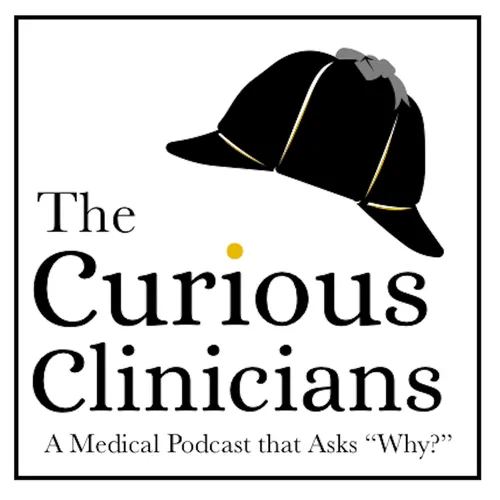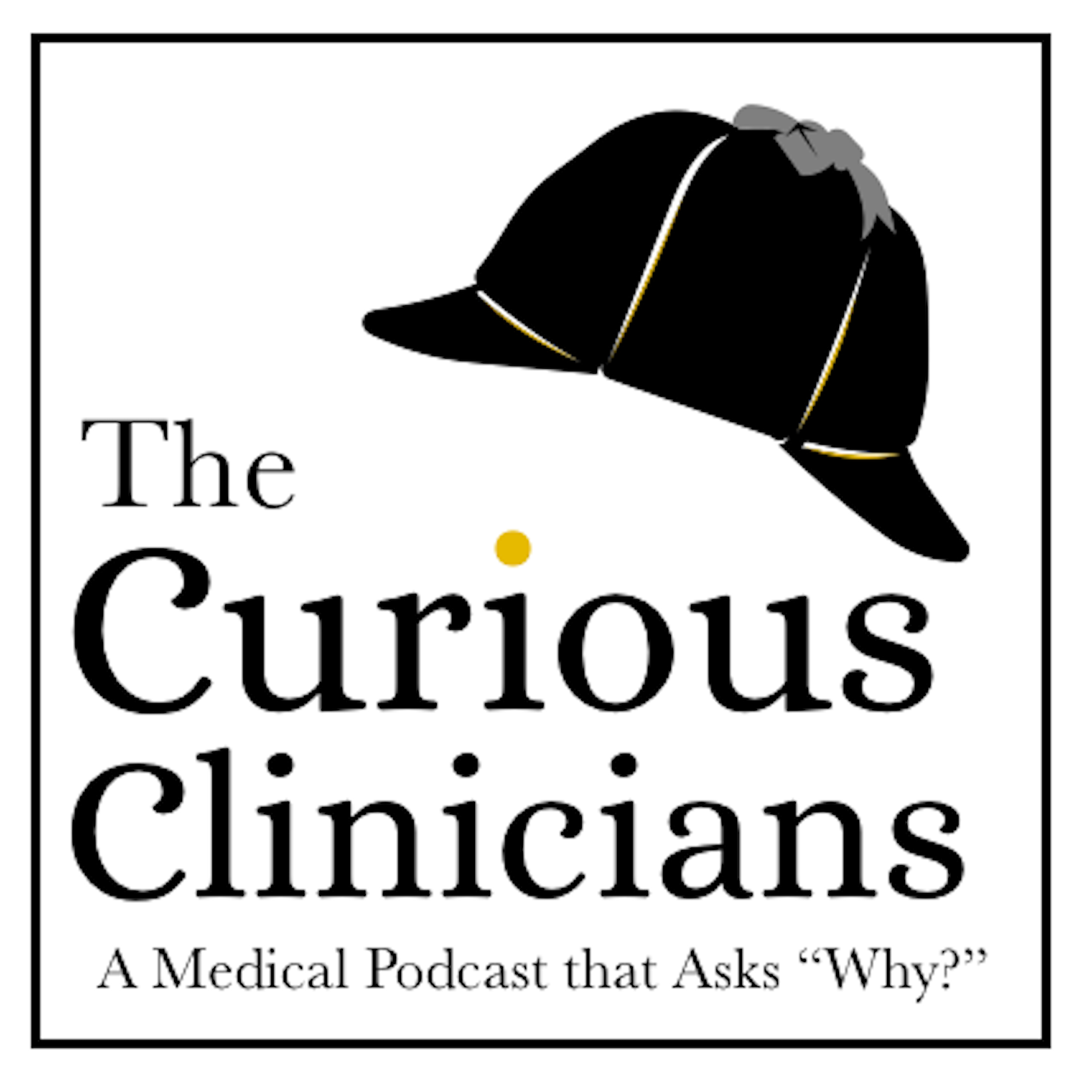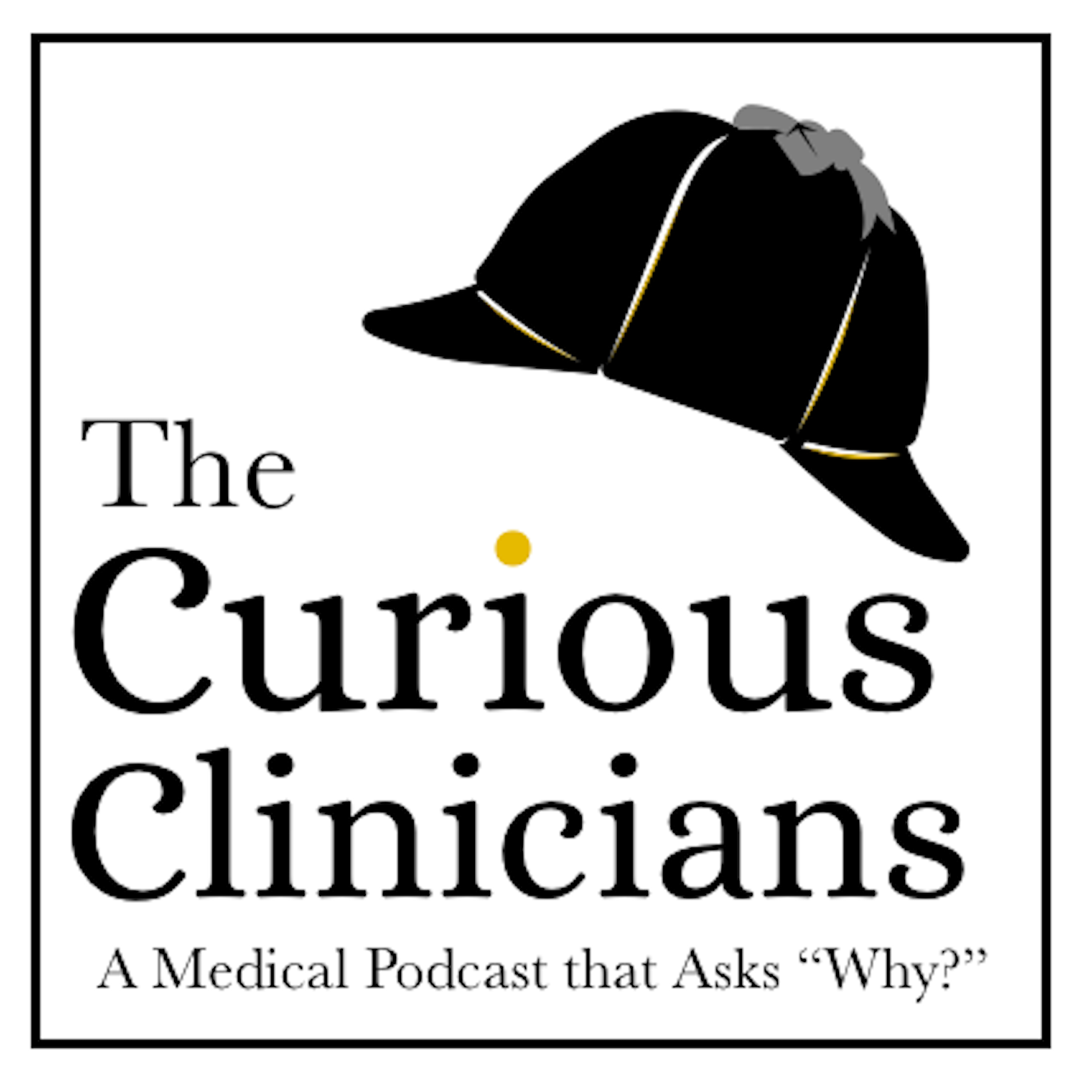
The Curious Clinicians
The Curious Clinicians is a medical podcast that asks "why?". Why do diseases present in certain ways? What are the mechanisms of treatments we use? Why does the human body function as it does? Join us to explore these questions and many more.
- Update frequency
- every 13 days
- Average duration
- 23 minutes
- Episodes
- 135
- Years Active
- 2020 - 2025

33 - What's in a (drug's) name?
In this episode, The Curious Clinicians examine why the drug Carbidopa-Levodopa has the brand name Sinemet. They also discuss the origin stories of the names of several other commonly prescribed medi…

32 - The Case of the Vanishing Eosinophils
On this episode the Curious Clinicians investigate why corticosteroids often cause blood eosinophil counts to drop so quickly and dramatically.
Check out the show notes on our website.
Don't forget…

31 - Nephrotic Syndrome and Edema
The Curious Clinicians, led by Tony, investigate why nephrotic syndrome causes edema.
Check out the show notes on our website.
Don't forget to pick up your CME/MOC credits, courtesy of VCU Health!
S…

30 - Cilantro and Soap
In this episode The Curious Clinicians investigate why some people absolutely love cilantro while others taste soap if they try to eat it.
Check out the show notes on our website.
Don't forget to pic…

Episode 29 - Oxygen
In this episode The Curious Clinicians investigate why too much oxygen (aka hyperoxia) can be harmful.
Check out the show notes on our website.
Don't forget to pick up your CME/MOC credits, courtesy…

Episode 28 - UTIs
For the final episode in our Intern Questions series, The Curious Clinicians examine why urinary tract infections cause burning with urination.
Check out the show notes on our website.
Don't forget t…

Episode 27 - Albuterol
This week The Curious Clinicians examine why albuterol (and other beta agonists) can cause lactic acidosis.
Check out the show notes on our website.
Don't forget to pick up your CME/MOC credits, cou…

Episode 26 - Hyperkalemia
Tony, Hannah and Avi are back at it with another cardiology-nephrology episode, this time examining why calcium “stabilizes” the cardiac membrane in hyperkalemia. For that matter, what does it even m…

Episode 25 - Furosemide
In this episode The Curious Clinicians investigate why furosemide can improve dyspnea in acute heart failure almost immediately, long before any diuresis occurs.
Check out the show notes on our webs…

Episode 24 - Fevers and Response to Infection
On this episode Tony explores the benefits of fevers, including why even trees and bees mount fevers in response to infection.
Check out the show notes on our website.
Don't forget to pick up your …

Episode 23 - Bendopnea
This episode is another installment in our Intern Question series, where Hannah examines why some patients feel short of breath specifically when bending over aka "bendopnea".
You can read the show …

Episode 22 - Cystic Fibrosis
The Curious Clinicians explore a theory about the prevalence of CFTR gene mutations and why cystic fibrosis carriers may have a selective advantage.
You can read the show notes for this episode on ou…

Episode 21 - Fevers and Rigors
Hannah, Avi and Tony examine why we feel cold while febrile (shouldn't we feel hot?) and can develop shaking chills/rigors. The answer has implications for why rigors may be a more timely predictor o…

Episode 20 - STEMI
Avi, Hannah, and Tony investigate why myocardial infarctions lead to ST elevations (and/or ST depressions) on EKG. The answers they found are mind-bending.
You can read the show notes for this episo…

Episode 19 - DIC
This episode is another installment in our "Questions from Intern Year" series. Hannah explores whether disseminated intravascular coagulation (DIC) can itself be a source of shock.
You can read the …

Episode 18 - Thirst
In this episode of The Curious Clinicians, Tony, Hannah and Avi learn about the mechanisms of thirst, why drinking liquids immediately quenches thirst, and why patients with primary polydipsia drink …

Episode 17 - The Eyes Have It (Part II)
This is the second episode in a two-part series called "The Eyes Have It", where The Curious Clinicians explore questions related to the eye. In this episode Hannah, Avi, and Tony learn about why bil…

Episode 16 - The Eyes Have It (Part I)
This is the first episode of a two-part series called "The Eyes Have It", where The Curious Clinicians explore questions related to the eye. In this episode Tony, Hannah, and Avi explore why Wilson d…

Special Episode: Tony's Guest Appearance on Bedside Rounds
Tony appeared as a guest on the Bedside Rounds podcast with Adam Rodman. Tony and Adam delve into race, racism, and the social determinants of health through three historic plagues in the United Stat…

Episode 15 - Cryptococcal Meningitis
Learn about why cryptococcal meningitis can cause such severe elevations in intracranial pressure, while often causing only minimal inflammation.
Don't forget, you can get CE/MOC credit just for li…